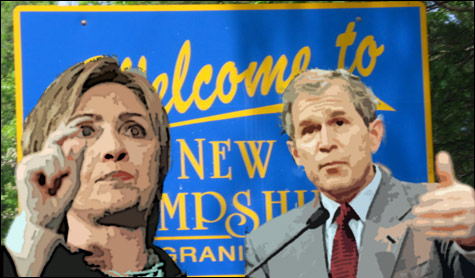
HILLARY AND GEORGEL More in common than you might think |
Well, there are less than 21 months before the election, and the “Tote Board” is already computing the odds. But, as explained last week, we need to set out a few rules that shape any presidential election before getting down to the serious business of rating the contenders. Last week, we talked about the overriding importance of having a compelling idea or theme. This week, three more rules:
Rule 2: It Helps to Have Run Before
Nothing compares with the experience of running for president — the 24-hour pressure over many months, the challenge of building an organization, the fundraising, and the constant scrutiny by the media. Those who have been through it before are much better prepared the next time around. Even the “Great Communicator” himself, Ronald Reagan, had to run for president twice unsuccessfully before winning the nomination in 1980. Al Gore, Bob Dole, George Bush the elder, George McGovern, Richard Nixon, and Hubert Humphrey all failed in their first tries for the office before ultimately gaining the nomination and, in some cases, the presidency.

In the modern era, there have been candidates who won the nomination on their first try for the office — Jimmy Carter, Mike Dukakis, Bill Clinton, or John Kerry — but they all mostly ran against either neophytes like themselves or candidates who had run before but, for better or worse, had no chance of winning (like George Wallace). That’s not the case this year. George Bush the younger, of course, falls into the “first try” category, but his experience in 2000 added a new wrinkle to this rule: If a close relative has run before, that’s almost as good as having run yourself. That’s because the related candidate can inherit a network of supporters and donors and probably knows better than most what’s involved in organizing a successful candidacy. All of which makes Carter’s and Clinton’s achievement of winning the nation’s highest office on the first try pretty remarkable.
This time around, John McCain, John Edwards, and Hillary Clinton are the big beneficiaries of this rule — though in Hillary’s case, the more she relies on Bill, the more it ultimately hurts her candidacy among the many voters who still have “Clinton fatigue.” So she’s walking a tightrope. The others are playing catch-up. For Rudy Giuliani and Barack Obama, this is likely their biggest hurdle.
Rule 3: It Helps Not to Come from Washington
It’s been characteristic of American political history that candidates from Washington tend not to do as well as candidates from other parts of the country. There may be several reasons for this. Americans love “outsiders.” They recognize that governors or military leaders probably have better executive skills than legislators. These executives don’t have to defend a complex congressional voting record that can be easily distorted. Whatever the reasons, while the two major parties occasionally nominate a senator (Dole, Kerry), the senator seldom wins in November. You have to go back to John Kennedy, in 1960, to find a successful presidential candidate from the Senate, and his opponent, Nixon, hardly posed a threat as an outsider. (Interestingly, Nixon won only when he ran as a private citizen, far away from Washington, in 1968.)
What makes 2008 such an interesting race is that the candidates who benefit from this rule are almost the opposite of those whom the second rule favors. McCain has been in Washington for years — in fact, so long that it’s going be virtually impossible for him to run again as an “outsider,” as he did in 2000. Hillary has been a fixture of the Washington scene for well over a decade. Only Edwards, among the former candidates, has managed to extricate himself from the Beltway.
In contrast, Giuliani — and to a lesser extent Mitt Romney, Bill Richardson, and Tom Vilsack — are well positioned historically. Obama isn’t in bad shape either. His critics may find him inexperienced because he recently arrived in the Senate, but the longer he stays there the less electable he becomes as a potential national leader. In terms of his career path, Obama is much better off running while he’s still a fresh face unidentified with DC. Voters tend not to care much about candidates’ prior experience, as long as that experience hasn’t made them “tools of the Establishment.” Just ask Abe Lincoln, who rode one unsuccessful term in Congress and a losing candidacy for the Senate to the presidency.
Rule 4: You Can’t Win If a Majority of the Country Will Never Vote for You
This may seem obvious, but it’s worth reiterating. It’s no wonder candidates with big ideas, a base outside Washington, and prior national campaign experience have done well. But some candidates don’t do well, no matter how many of these bases they have covered, because a majority of the electorate would vote for anyone but them if the race came down to two candidates. In a rare pairing, George Wallace and Jesse Jackson come to mind in this regard.